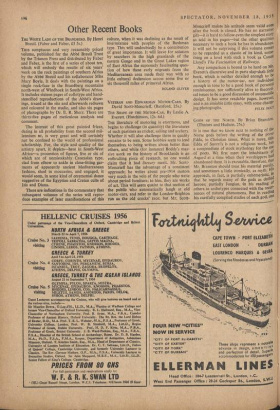VETERAN AND EDWARDIAN MoToit-Cnes. By David Scott-Moncrieff. (Batsford, 25s.) THa
literature of motoring is enormous, and begins to challenge (in quantity) the literatures of such pastimes as cricket, sailing and archery. Whether it will also challenge them in quality remains to be seen. Some hobbies seem to lend themselves to being written about better than others, and while (for instance) Boddy's mas- sive work on the history of Brooklands is an enthralling piece of research, no one would claim that it had literary merit. Mr. Scott- Moncrieff has the advantage of a consistent approach; he writes about pre-1914 motors very much in the vein of the people who write about period furniture; to him, they are works of art. This will seem quaint to that section of the public who automatically laugh at old motor-cars, and refer to the London-Brighton run as the old crocks' race; but Mr. Scott- Moncrieff makes his attitude seem valid even after the book is closed. He has no narrative gift—it is hard to follow even the simplest storY as told in his pages—but the other qualities necessary to such a book he has in abundance. It will not be surprising if this volume conte5 to be regarded as a classic of its kind, some' thing on a level with such a book as Canon Lloyd's The Fascination of Railways.
Any comparison is bound to be hard on Mr. Everett's discursive and in parts slap-dash little book, which is neither detailed enough to be a history of the motor-car, nor individual enough in tone to be a good book of personal, reminiscence, nor sufficiently alive to theorem cal issues to be a good discussion of automobile design. It has some readable pages, however, and is an amiable little essay, with some chartv










































































 Previous page
Previous page